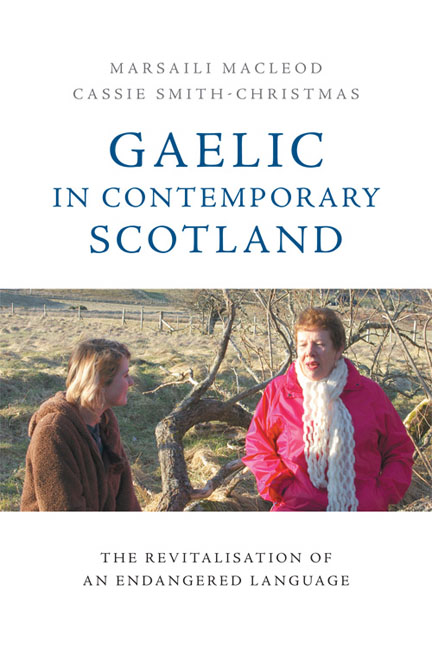Book contents
- Frontmatter
- Contents
- List of Figures
- List of Tables
- Notes on Contributors
- Foreword: Assailed yet Resolute
- Acknowledgements
- List of Abbreviations
- 1 Introduction
- 2 The Language of the Playground: Activists Building Consensus on the Language Policy and Ethos of a New Gaelic Immersion School
- 3 Mismatches between National and Local Gaelic Development: Cròileagan Dùn Èideann and the Promotion of Gaelic-medium Education
- 4 Gaelic amongst Schoolchildren: Ideas on Language Change and Linguistic Choices in Gaelic
- 5 When School is Over and Done With: Linguistic Practices and Sociodemographic Profiles of Gaelic-medium Educated Adults
- 6 New Speakers of Gaelic: A Historical and Policy Perspective
- 7 Learning Gaelic in Adulthood: Second Language Learning in Minority Language Contexts
- 8 Dlùth is Inneach: Charting Language Ideology in the Contemporary Gaelic World
- 9 Gaelic Language Use in Public Domains
- 10 Planning for Growth: The Professionalisation of the Taskforce for Gaelic Revitalisation
- 11 Organisational Language Planning: Gaelic Language Plans in the Public Sector
- 12 The Future of Gaelic Language Revitalisation in Scotland
- Index
2 - The Language of the Playground: Activists Building Consensus on the Language Policy and Ethos of a New Gaelic Immersion School
Published online by Cambridge University Press: 18 December 2019
- Frontmatter
- Contents
- List of Figures
- List of Tables
- Notes on Contributors
- Foreword: Assailed yet Resolute
- Acknowledgements
- List of Abbreviations
- 1 Introduction
- 2 The Language of the Playground: Activists Building Consensus on the Language Policy and Ethos of a New Gaelic Immersion School
- 3 Mismatches between National and Local Gaelic Development: Cròileagan Dùn Èideann and the Promotion of Gaelic-medium Education
- 4 Gaelic amongst Schoolchildren: Ideas on Language Change and Linguistic Choices in Gaelic
- 5 When School is Over and Done With: Linguistic Practices and Sociodemographic Profiles of Gaelic-medium Educated Adults
- 6 New Speakers of Gaelic: A Historical and Policy Perspective
- 7 Learning Gaelic in Adulthood: Second Language Learning in Minority Language Contexts
- 8 Dlùth is Inneach: Charting Language Ideology in the Contemporary Gaelic World
- 9 Gaelic Language Use in Public Domains
- 10 Planning for Growth: The Professionalisation of the Taskforce for Gaelic Revitalisation
- 11 Organisational Language Planning: Gaelic Language Plans in the Public Sector
- 12 The Future of Gaelic Language Revitalisation in Scotland
- Index
Summary
Language ideology in Edinburgh and Gaelic-medium education
As an alternative pedagogical model, additive immersion education is clearly a success; by a range of measures and in a variety of contexts, students in immersion schools have been shown to equal and even surpass the attainment of their mainstream peers (for research on attainment in Scottish Gaelic immersion see: Johnstone et al. 1999; Highland Council 2009; O'Hanlon et al. 2013). However, as a tactic for language revitalisation, the efficacy of immersion education is far less certain; while students may attain reasonable communicative competence in their classroom language, that competence does not always translate into much social use of the language outside of school (Dunmore 2014, 2016 and this volume; O'Hanlon 2012). Parents and educators often hope that out-of-classroom spaces in the immersion school – the cafeteria, the hallways and particularly the playground – might serve as sites where students can be encouraged to use the school language informally together, thereby normalising the school language as a social language for use outside of the classroom. If immer-sion education is to function as an effective tactic for language revitalisation, children would need to not only acquire full proficiency in the threatened language, but also be motivated to take the language out of the classroom and use it in their daily lives outside of the school, and then, ideally, in the future as adults. This is a difficult aim, but it is not impossible or unprecedented, and language ideology plays a central role in this regard. If immersion schooling is founded on a clear revivalist ideology linking language and identity, an ideology that leads to a strong, independent school ethos and a coherent school language policy, immersion schools can both provide excellent bilin-gual education to their students and serve as an effective means for language revival in their communities (cf. Nahir 1998; Brenzinger and Heinrich 2013).
Immersion education does not always develop in this way, but it can, and this natu-rally raises the question, when it does, why? Why do some immersion schools develop a strong ideological focus and others less so? In this chapter, I will suggest that part of the answer may be found by examining the history of the establishment of immersion chools.
- Type
- Chapter
- Information
- Gaelic in Contemporary ScotlandThe Revitalisation of an Endangered Language, pp. 17 - 31Publisher: Edinburgh University PressPrint publication year: 2018



